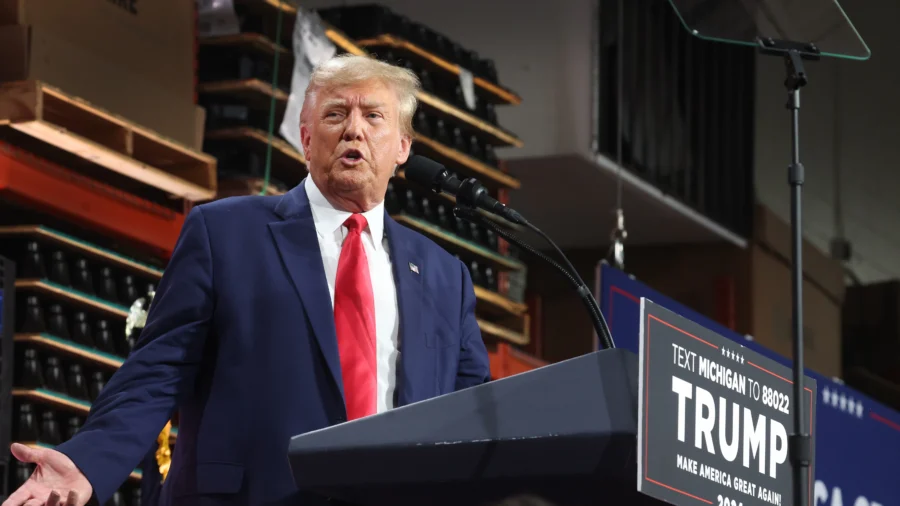New York Attorney General Letitia James’s case against former President Donald Trump and his two adult sons will begin Monday, Oct. 2, after an appeals court ruled against President Trump’s motion to delay the case.
On Tuesday, Manhattan Supreme Court Justice Arthur Engoron sided with Ms. James, ruling that President Trump and his organization are liable for fraud. He also revoked the business licenses of President Trump and his adult sons Eric Trump and Donald Trump Jr., and ordered the dissolution of Trump Organizations and its various companies, the details of which still have to be hashed out in court.
The appeals court had agreed to an emergency ruling when President Trump sought to delay the trial. The former president sued Justice Engoron on Sept. 14, claiming the judge had ignored a June ruling from the appeals court that President Trump claimed should render the case beyond the statute of limitations.
In the Thursday decision, the appeals court lifted an order to pause the case proceedings as well as the motion to delay.
President Trump’s legal team has indicated they will appeal Justice Engoron’s decision.
Partial Ruling
Ms. James is seeking $250 million in damages and brought seven claims against President Trump in her civil case.
Last month, she asked the judge for a pre-trial summary judgment, or decision, on one of the seven claims—that President Trump had inflated his net worth by up to $2.2 billion, defrauding lenders and insurers.
Justice Engoron found President Trump liable for fraud on Tuesday, going further than what Ms. James sought in penalties when he unexpectedly ordered the dissolution of the Trump Organization. He gave both sides 10 days to nominate an independent reviewer to manage the dissolution of the businesses. The independent “receiver” would function much like an executor.
Alina Habba, a legal spokesperson for President Trump, stated the decision was “fundamentally flawed at every level.”
“It is important to remember that the Trump Organization is an American success story,” Ms. Habba stated. “The fact that this Court summarily found that there is no question of fact, finding in part that Mar-a-Lago is worth approximately $20 million and issue a decision of this magnitude is an affront to our legal system.”
During the trial, Trump attorney Christopher Kise asked the judge whether his order meant that buildings owned by LLCs under the Trump Organization would be sold off. This would include high-profile properties like Trump Tower and 40 Wall Street, as well as a family estate in suburban Westchester County.
“Is it the court’s position that those assets are now going to be sold or just going to be managed under the direction of the (receiver)?” Mr. Kise asked. He noted that some of the properties owned by LLCs under the Trump Organization have nothing to do with the case, such as the private homes of President Trump’s sons, who are defendants in the case.
The judge consulted with his clerk before answering that he was “not prepared to issue a ruling right now.”
During the trial beginning next Monday, Justice Engoron, and not a jury, will determine the fate of President Trump’s businesses in New York. He will also have to rule on the six other claims Ms. James’s office has brought forth, and determine how much President Trump will need to pay in penalties.
Appeal Arguments
President Trump’s latest appeal had to do with the statute of limitations.
The June appeals court ruling had said several allegations in Ms. James’s claim fell outside the six-year statute of limitations, and said that she could not pursue the claims before July 2014 and February 2016. After this decision, Ivanka Trump was removed from the case as a defendant, because she argued that she had left Trump Organization in 2016.
Ms. James had argued against the appeals court decision, claiming that later financial statements in question reflected those earlier claims.
In Justice Engoron’s Tuesday summary judgment, he dismissed President Trump’s motion to dismiss the case based on this argument to be “pure sophistry,” siding with Ms. James in stating that the financial statements are what the case looks at.
He further dismissed, at length, a repeated defense President Trump has made, referencing the disclaimers on all the financial statements submitted to the banks and insurers Ms. James says he defrauded. The disclaimer notes methods used to arrive at the valuations and notes that financial institutions using different methods may come out with different numbers.
Justice Engoron wrote that the statements in no way protect President Trump from liability for incorrect valuations, as he has claimed.
Ms. James is relying on the Martin Act, an anti-fraud law that does not require the prosecutor to show that President Trump intended to commit fraud, or that damage was done to the lenders and insurers. It is considered an overly broad, “blue sky” law, which a Wall Street Journal editorial board piece dubbed “the worst law in America.”
Under this act, Justice Engoron noted that “disgorgement of profits” is an available remedy, hence his order of the dissolution of the Trump Organization.
From The Epoch Times


